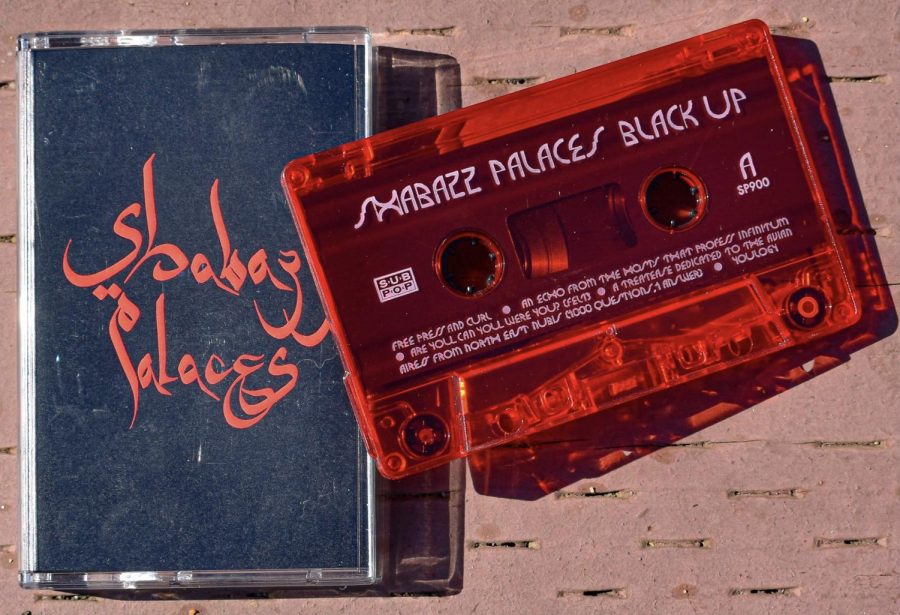10 Years Later “Black Up” Is Still a Groundbreaking Album
“Black-Up” was originally released on June 28, 2011.
September 22, 2021
Shabazz Palaces released their debut studio album on June 28, 2011, and more than 10 years later their first album is still an incredible testament to the group’s unique work.
With two previous self-released EPs this was the group’s first album under Sub Pop, but this was not Palacer Lazaro’s first rodeo in the music industry. Ishmael Butler a.k.a. Palacer Lazaro has been in the hip-hop industry for a long time, and has done previous work with the group Digable Planets.
Tendai Maraire is the other half of the group. He is a longtime percussionist who joined forces with Lazaro after they met in the vibrant music scene of Seattle.
Five studio albums later the group is still going strong, releasing new music on a regular basis, but what led them here?
When the group released their first studio album “Black Up,” little was known about the Seattle duo. People knew it was Lazaro and Maraire, but the mysterious group with no press releases or interviews was rather obscure. That did not stop the duo from creating a work of art.
The album has 10 songs and runs for 36 minutes long, a very good balance of length and density, and has no features.
The variation of sounds on this project is very notable. The duo keeps a consistent new flow of new ideas and unique sounds throughout the entirety of the album.
The duo’s ability to use such unique sounds in a well-put-together and thorough approach is stunning. They are able to bring new ideas to a genre that has traditionally stuck to its roots with varying degrees of experimentation.
Hip-hop is a controversial genre known for its sometimes absurd and explicit themes, but Shabazz Palaces feels unlike any other in the genre.
Their other albums are vastly different from “Black Up,” and their 2017 twin release of “Quazarz: Born on a Gangster Star” and “Quazarz Vs. The Jealous Machines” were notably different from their previous work. The more short and broken-up songs, packed with new sounds and collaborations, are a more connected journey but have weak links that cannot seem to match the power of “Black Up.”
Some stand-out tracks from the album include “Are You… Can You… Were You? (Felt),” “Free Press and Curl,” and “Swerve… The Reeping of All That Is Worthwhile (Noir Not Withstanding).”
“Are You… Can You… Were You? (Felt)” is an emotional tale of being Black in America, and it critiques the culture in hip-hop that is filled with materialism.
The lyrics of the song help to highlight the ways in which the culture has been pushed in the wrong direction, and for Butler, this means a heavy rap song.
The song is broken into two distinct parts, one a more laid-back and slow-moving groove with Butler rapping over the top, and the other a more fast-paced and heavy-hitting traditional rap moment.
The song is extremely complex and feels very futuristic, but holds a sense of nostalgia in my mind.
“Free Press and Curl” is the beginning song for the album, and offers a strong introduction into what is to come. It has the heavy bass that is seen throughout the project, but is also filled with more laid back vocals as the song progresses. Near the end it brings more of a high vocal catchy feeling to it, but it moves back to heavy bass and finishes at a similar place to where it started.
This song feels like the perfect way to welcome the listener into what is to come.
“Swerve… The Reeping of All That Is Worthwhile (Noir Not Withstanding)” ends the album off with a long tale of the album’s theme of being Black in America. It has multiple segments and feels like the perfect ending to the album. The heavy bass and rapping of the first part move smoothly into a female voice singing over a toned down relaxing beat and finally ends with a simple percussion and singing bit with a strong message of black empowerment. A steady groove carries the song as it wraps up the album and sends you off into the world again.
With such a unique sound this album was groundbreaking at the time and it met large critical acclaim, and most notably the popular blog Gorilla Vs. Bear placing the album as Best Album of 2011. Now 10 years later as critics wrapped up the 2010’s Pitchfork placed it at number 179 of the 200 best albums of the 2010‘s. While that isn’t super high on the list it’s still important to recognize the impact this album has made on hip hop culture and beyond.
This album still feels relevant to this day and feels modern in its sounds, and has yet to be matched by any of the artists today. The duo has set themselves apart from the rest in the time since, but still maintain the low level of fame and fandom they started with.
I rate this album 10/10, for it holds so much uniqueness in an accessible and easy listening package. It soars through an entire sea of emotions and new and mysterious sounds across its 36 minute run time, but does not cloud the duo’s ability to experiment with different sounds throughout the project.
The wave of creativity that the group rides on is not to be overlooked. I encourage you to listen to their entire library, but especially encourage you to indulge in “Black Up.”





